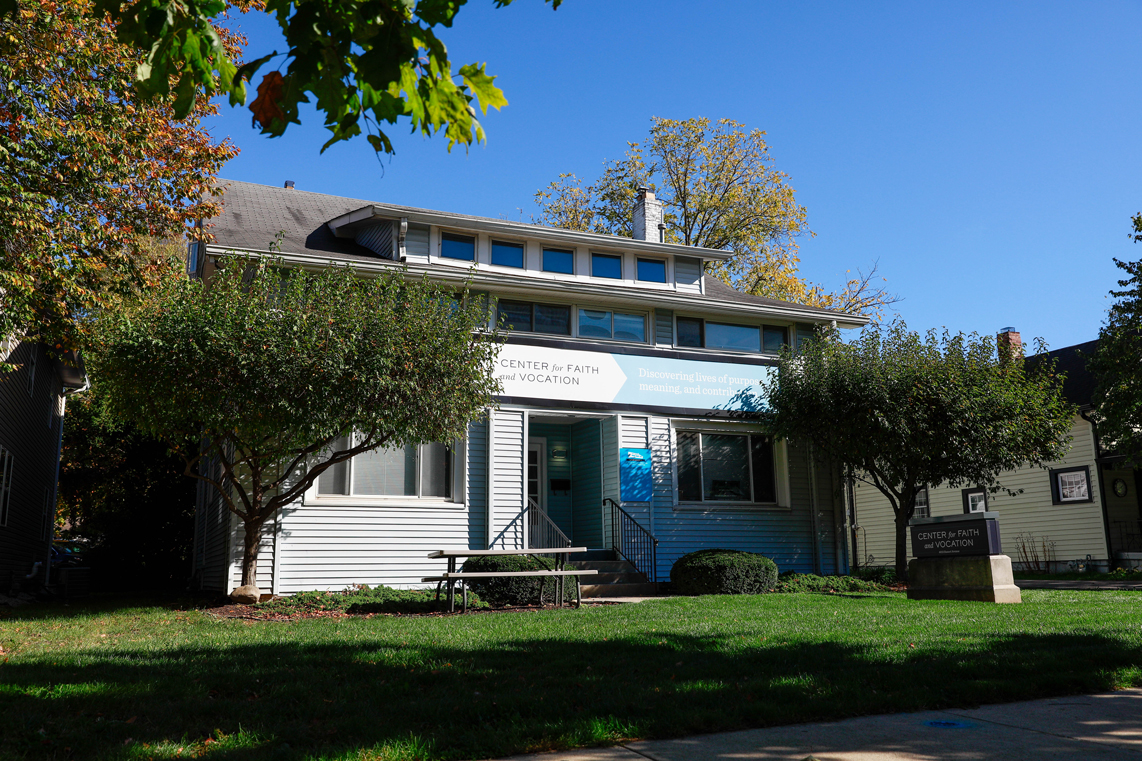The Center for Faith and Vocation on Hampton Ave. Photo courtesy of Butler.edu.
BEE PILARZ | NEWS CO-EDITOR | lpilarz@butler.edu
With classes back in full swing and the fall semester officially started, students can expect to find a plethora of organizations and resources at their disposal to make the best of their college career. One such resource is the Center for Faith and Vocation.
Located across the street from the Schrott Center for the Arts, the Center for Faith and Vocation (CFV) provides a space on campus for students of all faith backgrounds to explore their spirituality with their peers, as well as engage in secular conversation.
While the CFV is a space dedicated to faith community and discussion, it is also a space on campus where students can explore their future and start to consider what comes next after college. Director of the CFV Daniel Meyers said that they hope to provide space for reflection and thought on the future for students throughout their time at Butler.
“What we try to mean by [vocation] is helping students explore a sense of meaning and purpose,” Meyers said. “We’re trying to help students understand what their values are [and] use those values to make decisions.”
From service projects to film screenings, the CFV prides itself on having “something for every single person,” according to Jenna Burd, CFV interfaith community engagement intern and sophomore entrepreneurship and innovation and marketing double major. The CFV houses a diverse collection of communities, with the intention of providing for Christian, Muslim, Jewish and other students of all faiths and denominations.
One such community is the Atheist Agnostic Secular Coalition (AASC), which provides a safe space for those questioning their faith. Rebecca Kural, a junior music industry studies major and CFV Scholar, found a very involved community within the CFV, even though she does not practice a given religion.
“[There are] lots of random ways that I’ve been involved as someone who was actually not very religious, but I found that the CFV is actually a wonderful community, no matter how religious or not religious you are,” Kural said.
Similarly, Meyers emphasized the importance of multiple perspectives in interfaith discussions, and said the CFV is dedicated to making sure all voices are heard.
“Part of our commitment is to ensure that folks who identify as atheist, agnostic [or] secular … all those points of view are important for things like interfaith work as well as the kind of communities we have, so we have a couple of communities that are secular in nature in addition to the religious ones,” Meyers said.
Additionally, the Center for Faith and Vocation hired a Jewish life advisor — Michael Aronson — and a Muslim life advisor — Imam Anisse Adni — within the year.
Burd said she felt the positive impact of having life advisors on campus.
“They’re in charge of listening to the campus, what’s going on in relation to that religious and ethnic community and responding with interactive events or support for students who might be struggling,” Burd said. “It’s just really nice to have that advocate that is built into the CFV.”
Sophomore computer science major Omar Daas is a member of Butler’s Muslim Student Association (MSA). He feels Imam Anisse Adni, the Muslim life advisor, has made a positive impact on campus.
“Once a month he’ll lead a Friday prayer, which has been really nice,” Daas said. ”He’s been a good voice to talk to [and] get to know across campus. He’s been really involved [with MSA]. I feel like overall, he’s been a really good, helpful presence.”
For students looking to be involved with faith-based work from a diverse range of backgrounds, the CFV also hosts the Interfaith Council. The Interfaith Council is a close-knit student group composed of varying religious and spiritual backgrounds devoted to interfaith work on campus.
According to Meyers, the fall semester is usually dedicated to building community within the Interfaith Council by preparing for a campus or community project in the spring.
“[The Interfaith Council is] one of my favorite ways that I get to connect directly with students,” Meyers said. “ … There’s always the goal of creating a community for students who want to talk about religion, but maybe don’t know if they have a community here, or if they feel like they’ve only been able to meet folks who think similarly to them. This is a very tight, small group that gets to have permission to be curious about one another.”
While applications have closed for the 2023-24 Interfaith Council, students can look forward to events and initiatives hosted by the Interfaith Council throughout the coming year.
This school year, students can anticipate a new series of talks entitled “Black Diaspora: Faith and Expressions,” a collection of talks given by Black intellectuals on various faith-based topics. Each of these events will qualify for the Butler Cultural Requirement and are free to the public.
For a complete list of CFV and Interfaith Council sponsored events, students can reference the Center for Faith and Vocation Instagram @centerforfaithandvocation as well as their pages on the Butler website.


